Lebanon is facing multiple overlapping emergencies that have had dire consequences. The country’s ongoing economic crisis has made private health care prohibitively expensive, leaving more people reliant on the public health services. The COVID-19 pandemic and the massive explosion that devastated Beirut on August 4, 2020, have put additional strain on the already stretched public health system.
The country now faces a growing shortage of medical supplies and essential medicines (such as those used to treat chronic diseases), leaving the most vulnerable people at risk. Lebanon also hosts the largest number of refugees per capita in the world, which means that many of the displaced people living there have already endured traumatic experiences.
Doctors Without Borders/Médecins Sans Frontières (MSF) provides free health care across the country, addressing both the physical and mental health needs of Lebanese people, refugees, and migrant workers alike. Through our health activities in various locations, MSF teams are directly witnessing the deteriorating situation. We spoke with patients about their experiences and the mounting challenges they face.
BEKAA VALLEY
“At the end of the month, there’s no money left for medicine”
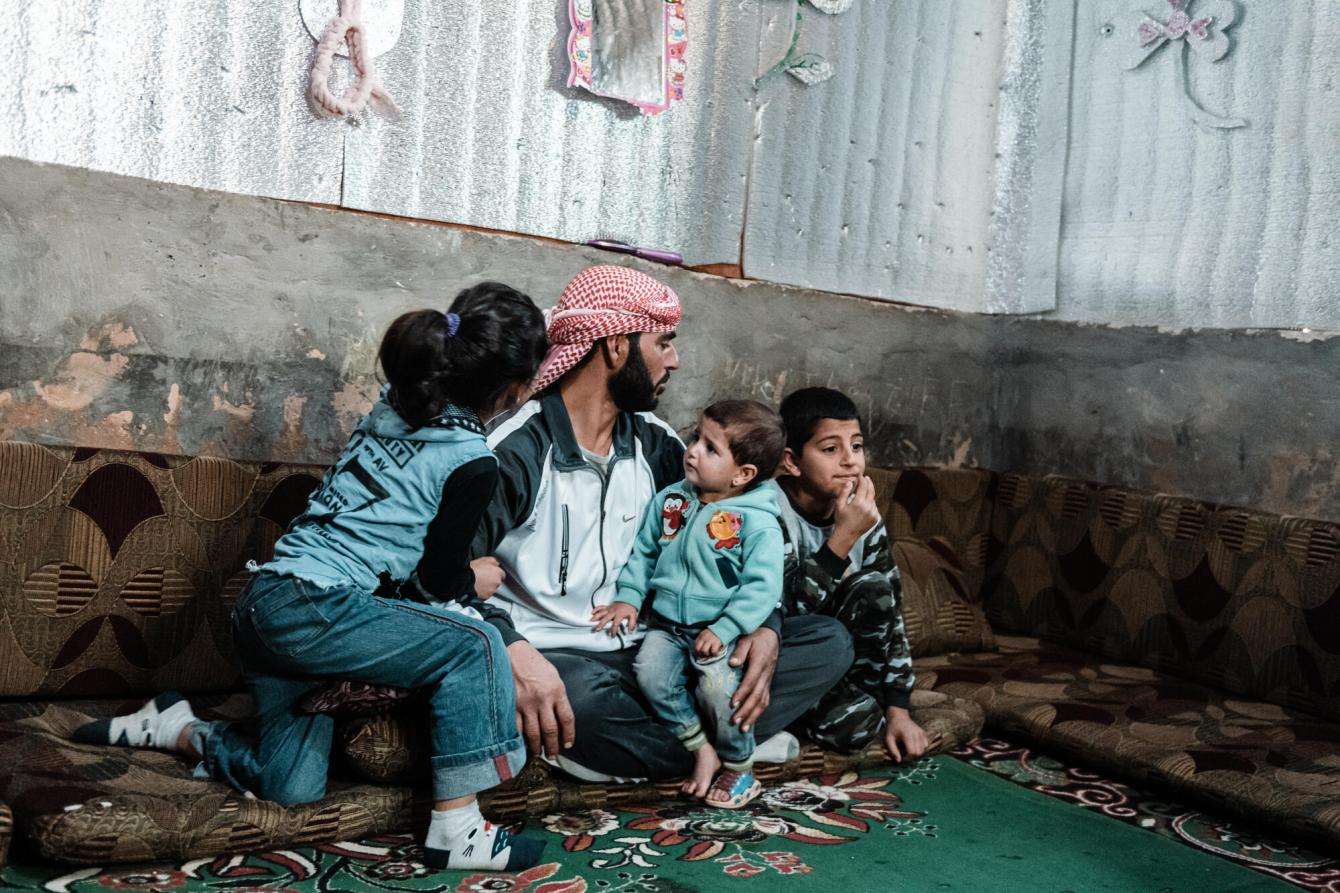
Ahmed, 34, is a father of four. He and his family arrived in Lebanon in 2015 from Flitah, Syria. Since then, they have been living in an informal tented settlement on the outskirts of Arsal, a town at the north of Bekaa Valley near the Syrian border.
On the day this photo was taken, Ahmed took his two daughters and his wife to MSF’s clinic in Arsal. His youngest daughter, 18-month-old Zeinab, was diagnosed with anemia about four months prior. “She looked very sick. She was very pale and ate very little,” Ahmed. “The doctor prescribed an iron supplement and advised us to feed her more vegetables and beans, since we can no longer afford meat.” Anemia is linked to iron deficiency and is common among people who have limited access to certain types of food such as meat or peas.
Ahmed used to be a shepherd before he came to Lebanon. Due to back pain, he had to stop working, but from time to time he helps his uncle tend the herd in the mountains around Arsal. Since the economic crisis hit Lebanon, Ahmed’s family has struggled to buy basic items.
“One kilo [2.2 pounds] of meat cost 17,000 Lebanese pounds [$11 USD] before, but now it costs around 60,000 Lebanese pounds [$39 USD],” Ahmed. “It’s the same for tea, sugar, and even tomatoes. Everything has become at least four times more expensive and it’s only getting worse. At the end of the month, there’s nothing left for clothes or toys for the children, or for medicines. We save all our money for food and fuel above all now, during the winter.” Arsal is located 1,500 meters [1 mile] above sea level. Snow and freezing temperatures are quite common during the cold winter months.
While Ahmed waits for his daughters, Zeinab, and her six-year-old sister, Fatima, to see a doctor, his wife, Halima—who also has anemia—attends a prenatal consultation with the midwife. Their fifth child is due in two months, an extra mouth to feed for the family’s already stretched budget. “Our entire family benefits from the medical services in this clinic, even my parents, who both suffer from chronic diseases. They come here too to get their treatment,” says Ahmed.
During the consultation, the doctor notes that Zeinab’s condition has improved, but that Fatima has caught a respiratory infection. The family’s precarious living conditions—a shelter made from cement
blocks and plastic sheeting—may have contributed to the girl’s health condition. Smiling shyly, Fatima confesses that she wants to be a doctor when she grows up. “I’m worried about the future for my kids,” says Ahmed, “but I hope that if they go to school and learn to read and write, they’ll be able to have a better life.”
“All I want is to be able to live decently”
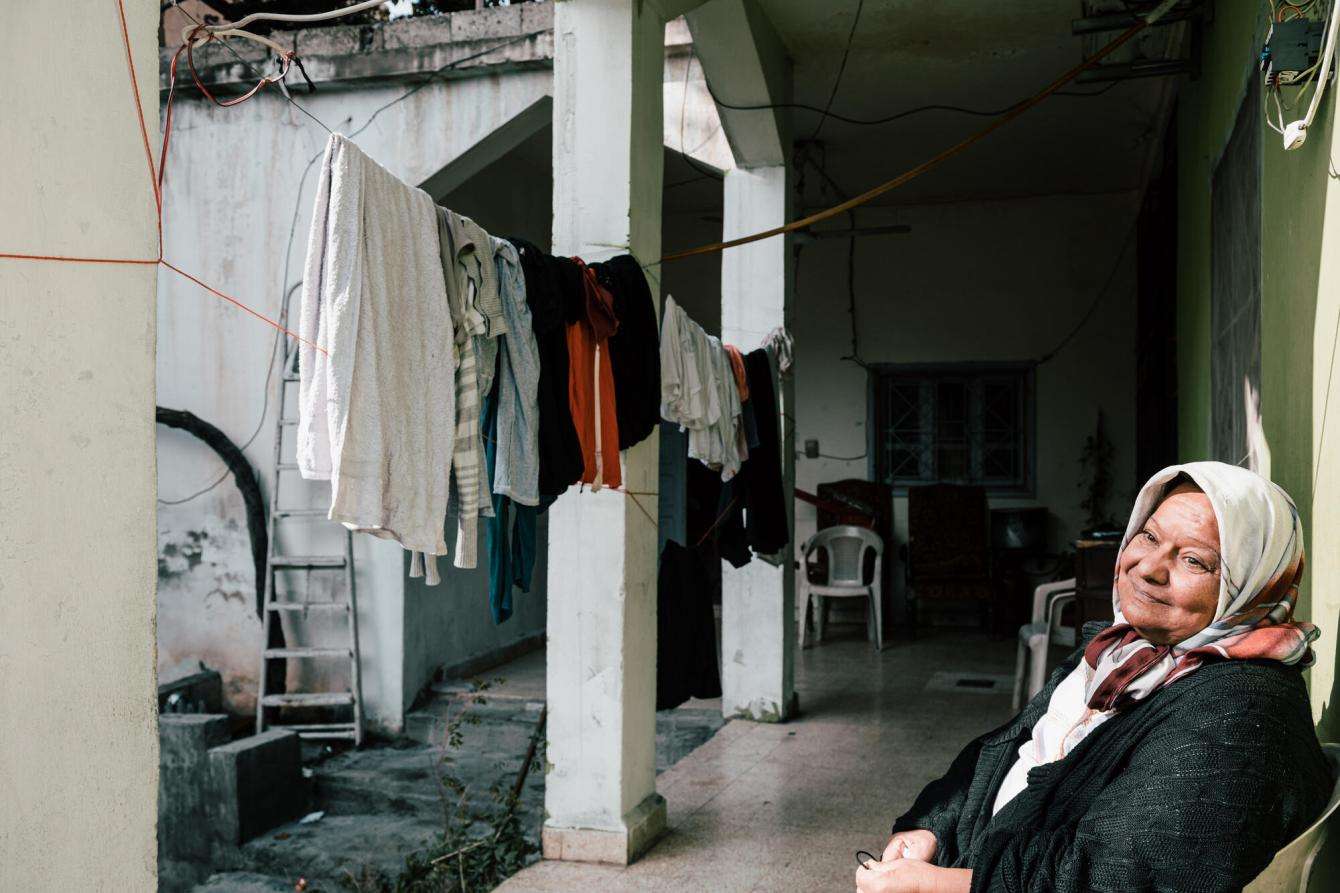
Fatima lives in Hermel, in the northern Bekaa Valley, with her husband and only daughter. Unable to afford their own home, they have to share one room in the house of her in-laws. For this 58-year-old Lebanese woman, who suffers from severe diabetes complications, making it through each day has become a real challenge.
“We have always been poor, but at least before we were able to cope,” says Fatima. “Two months ago, my husband lost his job. He was working in a vegetable store but, as there were fewer customers, they let him go. I used to work as a cleaner but I can’t work anymore because I was diagnosed with diabetes five years ago and since then my health has become a lot worse. I’ve lost sight in both eyes and developed a serious foot injury that prevents me from walking. I always need Hiba, my daughter, by my side to help me. I have constant pain throughout my body; sometimes it’s unbearable.
MSF does home visits to check on me and they provide me with the medications I need. Without MSF, I’d have to rely on people’s charity to get them. Our daughter works from time to time in a clothes shop after school and that’s our only income. We eat mostly lentils, bulgur wheat, and potatoes; a lot of potatoes. It’s not a very good diet for my diabetes, but that’s all we can afford.
I don’t feel well physically or emotionally. I cry a lot. I feel guilty about my little girl, Hiba, who has to bear responsibilities beyond her age and has to take care of us. Apart from the MSF psychologist, I have no one to talk to. I don’t want to add a burden on to the shoulders of my daughter or my husband.
And the rest of my family lives live in Beirut, far from here. I can’t think of anything comforting. The economic crisis has been the final straw. All I want is to be able to live decently.”
BEIRUT
“We are so tired”
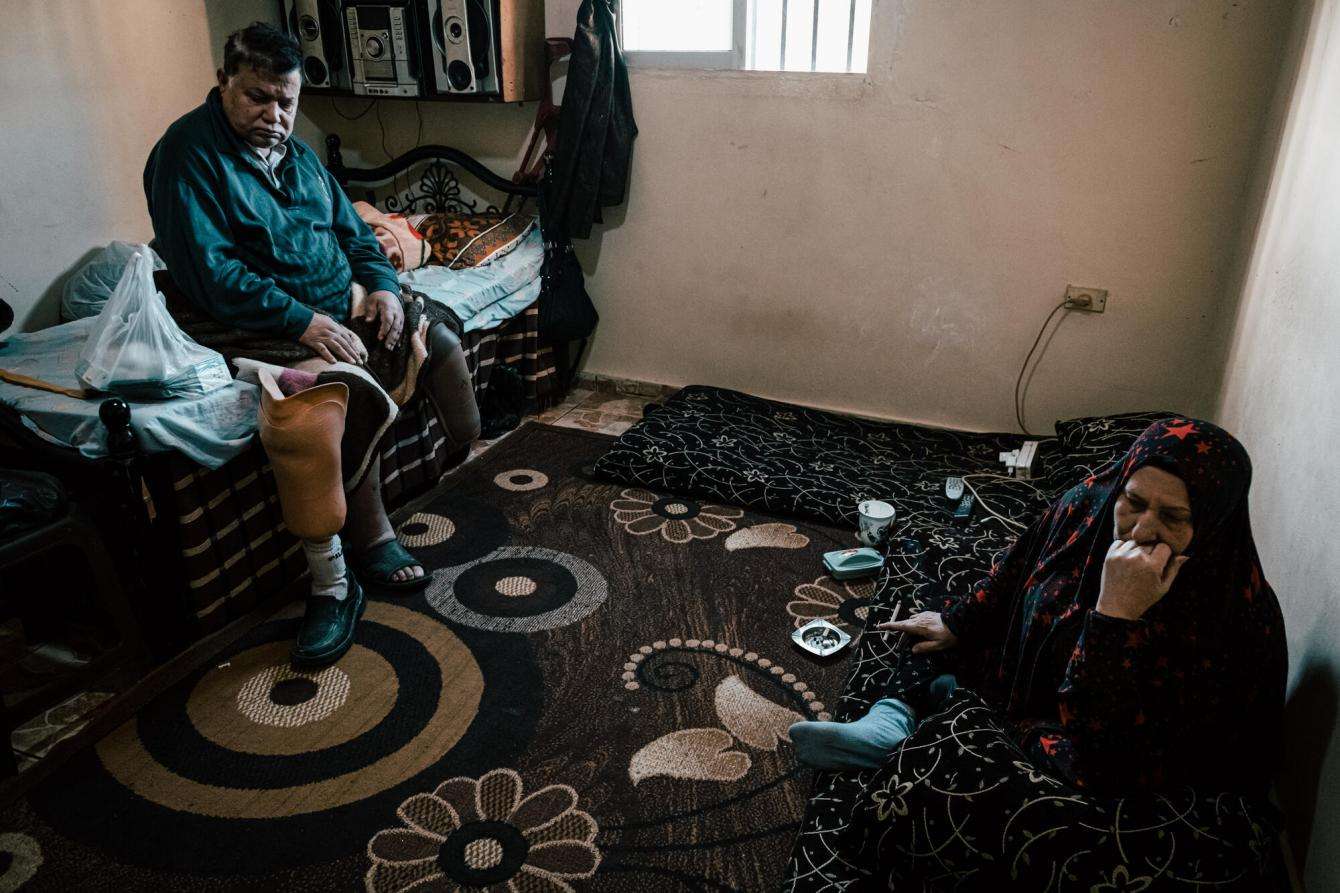
Tawfik is a 70-year-old Palestinian refugee. He is married to Hanadi, a Syrian woman, and they live in Shatila, a densely populated refugee camp in Beirut. They settled in Lebanon with their family in 2011 after fleeing war in their home of Yarmouk, Syria. Tawfik’s family relies entirely on support from UN agencies and humanitarian organizations to survive.
Life has not been easy for Tawfik and Hanadi, who lost a son in the Syrian conflict and have been without news of another of their children for 10 years. When they arrived in Lebanon, they didn’t expect that they would have to overcome even more difficulties. However, seven years ago, following a severe infection in his leg, Tawfik learned that he had diabetes. The wound complications led to an amputation.
“In Syria, I used to work as a tiler, but now with my condition I can’t do anything to support my family,” he says. “All our children are unemployed. Without the assistance we receive from charities, I don’t even know how we would survive.” Tawfik who lives on the third floor of a decrepit building with his wife, their youngest son, one of their daughters, and her two children.
The recent price inflation has made it increasingly difficult for the family to make ends meet. “Once we pay for rent and electricity, there is almost nothing left for food,” says Tawfik. “We are struggling to buy basic items such as tomatoes or chicken. Once every two weeks, we buy 200 grams [about half a pound] of meat that we share together. Otherwise, our meals are reduced to yogurt, cheese, and potatoes. And we still have to borrow money sometimes, to finish the month”.
Tawfik’s hands are shaking, a symptom of his low blood sugar. “It happens sometimes when we skip meals,” he says. Tawfik must take insulin every day, on top of six other pills, to help control his diabetes and hypertension. MSF provides him with all the medications free of charge, but his health remains unstable. Poor diet, a lack of physical activity, and stress are well-known risks factors for people living with diabetes.
“I feel completely down and useless. The economic situation in Lebanon is a disaster. I only hope we won’t end up on the streets,” says Tawfik. “
We are so tired,” adds Hanadi, his wife, unable to hold back her tears as she speaks.
“It has been a stressful time for everyone”
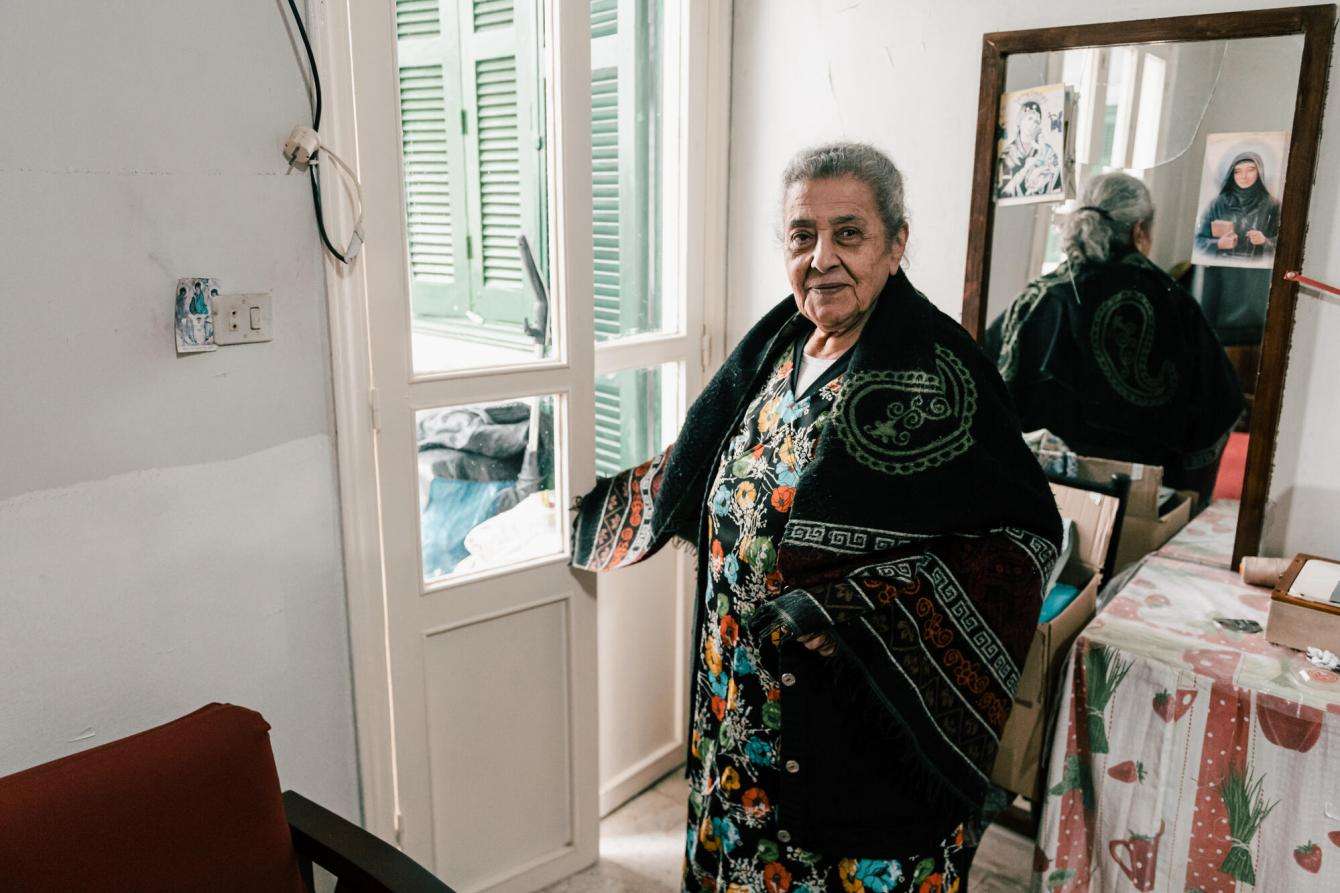
Thérèse, 85, lives in Karantina, a neighborhood near Beirut’s port that was heavily affected by the enormous blast on August 4, 2020. Although she only suffered minor injuries, her apartment was damaged in the explosion. Her sewing machine was broken, depriving her of her only source of income. Since then, this former tailor has relied mostly on community solidarity and humanitarian assistance to meet her basic needs.
“My sewing machine has been with me since 1973. Two years later, my husband died. This machine is like a life partner to me. Since the explosion, I have been trying to repair it, but it’s an old model so I can’t find the right parts.
The blast destroyed all the windows in my apartment. I was on the balcony when it happened and I was knocked to the floor. My head was bleeding and I had injured my leg on some shattered glass. The shock from the fall also worsened my back pain. Some shelves and my bed were broken. This is why I’m sleeping on the couch in my living room now and using the bedroom to store all the damaged furniture. I’m sewing new curtains by hand with old fabrics to replace the ones that were destroyed.
I was still doing some small sewing jobs before the explosion, even though I had some back pain and diminishing eyesight.
“My son was also supporting me, but his company reduced his work schedule after the blast and he earns only half his old salary now. He has to take care of his own family, so he can’t help me anymore. I have some savings and I’m receiving cash assistance from an international organization. A local association is also bringing me food boxes several times a week. I can barely walk and I rarely go outside, but my neighbors are helping me a lot. Some former clients also stop by from time to time to check on me. All in all, I manage to make it through.
“When the MSF doctor came, he told me I have diabetes. I never had diabetes before. My hypertension has also increased lately. I think this is all linked to the explosion. I’m being very careful to take my medicines every day and eat healthy because I can’t afford the hospital fees if I should have any serious medical issues.
It has been a stressful time for everyone, but I’m old already and I feel I’ve had a good life. For the younger generations though, I don’t know what will happen… We have to keep faith.”
NORTH
“It’s been a year since we ate fish or meat”
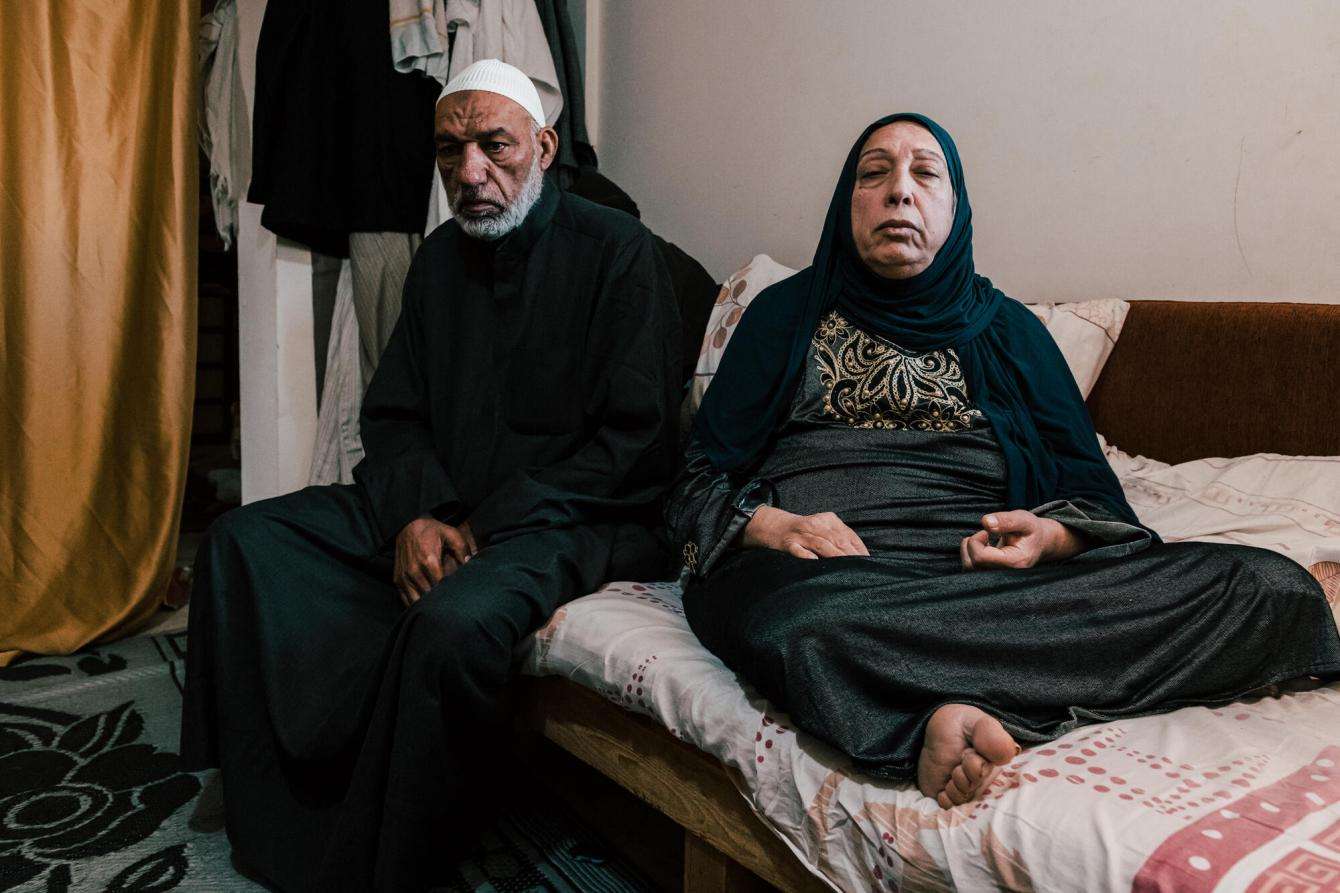
Hasna, 57, and Hassan, 65, arrived in Lebanon in 2012. This Syrian refugee couple live in a building under construction in Tripoli with their son, his wife, and their three children. Their son works in a hair salon and is the family’s only breadwinner.
Both Hasna and Hassan suffer from hypertension. Hasna also has to deal with diabetes and other heart problems. Between them, they have to take 13 different medications each month, including insulin. For eight years, MSF provided their medications for free, before handing over its medical activities in Tripoli to the Lebanese Ministry of Health. Recently, the couple has often had to borrow money from neighbors to buy their medications from the pharmacy, since some of the drugs they need are not currently available in public health centers.
“We can’t stop taking our medications and we also can’t afford to buy them,” says Hassan. While Hassan describes their situation, Hasna stands to go to the bathroom. She walks with difficulty, relying on her granddaughter to help her. “My wife needs physical therapy to relieve her pain,” says Hassan, “but we don’t have the money for that either.”
Even though their son has managed to keep his job throughout the economic crisis and COVID-19 pandemic, food has become a growing problem for the family over the past year, especially for Hasna, who has to follow a healthy diet to help control her diabetes. The price of daily food items has increased considerably over recent months, while the family’s only salary has remained the same. Many of their meals are now just rice and pasta. “It’s been a year since we ate fish or meat,” says Hassan.
The future is anxiety-inducing for the couple. “When we arrived, the situation wasn’t good for us, but it was definitely better than now,” says Hassan. “Today everything is a struggle: getting enough to eat, renting a place to live, getting hold of medications. Our grandchildren aren’t at school because of the coronavirus and they don’t have anything to do. What’s it going to be next?”





